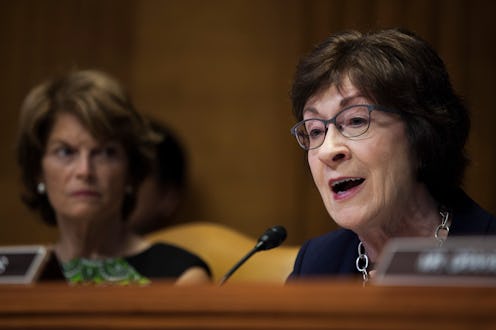News
How These Women Tanked The Republican Health Care Bill

After the complete collapse of the GOP's effort to pass its health care bill in the Senate this week, some observers are pointing fingers, looking to assign blame for the inability of the party in power to pass legislation that has sat at the top of its platform for seven years. As Republican leadership looks to pick up the pieces and figure out what went wrong, it should look to the three female senators who tanked the repeal-only strategy and realize they should have been listening.
After it was clear that the Republicans' health care bill to replace Obamacare would not have enough votes to pass, Senate Majority Leader Mitch McConnell, in an 11th-hour play, announced Monday night that they would vote on solely repealing Obamacare, with no new plan in place. But before the half-baked plan could get very far, three female Republican senators -- Susan Collins of Maine, Shelley Moore Capito of West Virginia, and Lisa Murkowski of Alaska -- slammed the idea, pulling the emergency brake on something so disastrous.
Passing this health care bill should've been a home run for the Republicans. They control both houses of Congress, as well as the White House. As long as the party's 52 senators stuck together and voted with the party line, this would've been a done deal and we'd all be stressing about how to afford pap smears.
But that's not what happened, and what transpired reveals how very fractured the Republican party is at the moment. That is due in part to the wide ideological divide among the party. But perhaps more importantly, the GOP leadership was unwilling to include a diverse set of perspectives in the conversations surrounding the creation of the bill. When senators' opinions and non-negotiables on this bill were not being heard, were they really expected to vote for it?
Those three female Republican senators had serious issues with the bill, which was no surprise to those who paid attention to what they were saying about it. Deep cuts to Medicaid, rising premiums for the elderly and the sick, a loss of support for rural hospitals and the defunding of Planned Parenthood were aspects of the bill they could not get behind.
How then, were these concerns not addressed in the writing of the bill? Because, when the 13-member group was first assembled to hash out the law in private, not one woman was included. And for a bill that had many implications for women on a very personal level, it was about as tone-deaf a decision as they come.
That inability to include a wide range of voices in the fold is a reason why the leadership doesn't understand why the party is not acting the way it expects it to. The fact that Senate GOP leadership thought they had a better chance of passing just the repeal of Obamacare with no new system in place shows just how little it understands its own party.
And maybe that's because, not only were women not initially included in the talks about the bill, but they are underrepresented on Senate committees in general. Women make up a much smaller percentage of the Republican party than the Democratic party, and now that the GOP controls both houses, there is much less female representation on congressional committees, especially the most influential ones. Republican women struggle to be heard in the halls of Congress, and their opinions don't seem to be as highly regarded within the party, they say.
This was not the fight the Republicans were expecting when they launched this bill. The party leadership is still counting on a party that is rank and file when it comes to these important votes. But that's clearly not the case, and it's significant that these women were willing to go against their party, especially when it had real ramifications for the completion of its agenda. This is how the new GOP operates, and the old guard better find a way to get on board if they want to have any legislative success.